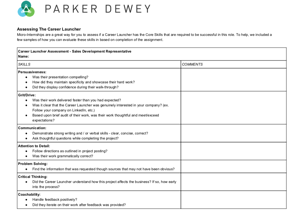Guide to Entry-Level Hiring
HR Coordinator/Recruiting Specialist
HR Coordinator/Recruiting Specialist
After reviewing thousands of open HR roles, we’ve identified the most common responsibilities outlined in software engineer job descriptions:
While these are specific responsibilities or requirements, what’s missing are the skills required to successfully execute them, which is especially important for entry-level hires who don’t have the professional track record and where GPA or major doesn’t demonstrate them. To help, we’ve worked with human capital leaders and marketing executives to map the underlying skills to the typical responsibilities below:
|
RESPONSIBILITY |
SKILLS |
|
| Establishes recruiting requirements by studying organization plans and objectives; meeting with managers to discuss needs | Grit/drive | Empathy |
| Builds applicant sources by researching and contacting community services, colleges, employment agencies, recruiters, media, and internet sites; providing organization information, opportunities, and benefits | Communication | Presentation |
| Administering various employee plans such as payroll, benefits, and other HR programs | Problem solving | Appetite for learning |
| Arranges management interviews by coordinating schedules; arranges travel, lodging, etc. | Organization | Team player |
| Attracts applicants by placing job ads, contacting recruiters, using job sites and social. | Creativity | Analytical thinking |
Many of these skills can’t be measured from a GPA, aren’t captured on a college student or recent grad’s resume, and can’t be assessed through an interview process, especially those Core Skills that often make the difference. In reality, the only way to evaluate these skills is when you see these candidates in action. Micro-Internships are a perfect, easy, low-risk and low investment way for employers to see candidates demonstrate these skills first hand.
Building upon this, we have crafted and tested a handful of Micro-Internships that not only provide hiring manager with immediate value, but also will help you uncover these skills:
We will provide you with a job description and would you to identify 25 prospects in a specific city that are qualified for the job. Once identified, please provide their contact information including name, phone, and email, and a brief justification as to why you think they would be a good fit for the role.
We would like you to research best practices of other companies to recognize their employees based upon years of employment (1 year, 3 years, 10 years, etc.). In particular, we would like to understand what "gifts" are most valued by employees and other ways of creating programs that align with company culture. Please note that the forms of recognition do not need to exclusively be a physical item or have a monetary value, but could be another form of recognition, an experience, etc. After conducting this research (which will likely include online research, calls to companies, discussions with friends, etc.), prepare a summary of the data, highlighting some of the most effective recognition programs and your suggestions on ideas.
We will provide you with 50 resumes and a job description, and would you to review each one and rank your top ten based upon their qualifications for the job. Once ranked, provide justification for why you ranked each of the ten where you did, and key questions and concerns you want to understand from an interview.
In order to help you pick the best candidate, you can also ask a question or two to screen the applicants - while not required, this is a great way to quickly learn about the candidates so you can select the best career launcher for your project. Here are the following we would recommend:
While there may not be any “right” answer, these types of questions allow a Career Launcher to stand out by conveying an insightful perspective or passion for the role.
Assessing The Career Launcher
As highlighted above, these assignments are a great way for you to assess if a Career Launcher has the Core Skills that are required to be successful in this role. To help, we included a things to look for in what the Career Launcher provides.
Download the full assessment here.

Win. Win.
The benefits are invaluable. As a result of the Micro-internship you will get:
Of course this is not just limited to HR roles. You can see some additional examples tied to other roles or departments here.
© 2026 Parker Dewey LLC